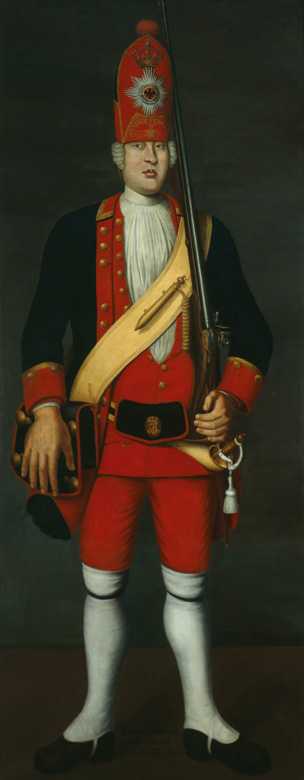A History of Western Society: Printed Page 481
A History of Western Society, Value Edition: Printed Page 496
The Consolidation of Prussian Absolutism

Frederick William I, “the Soldiers’ King” (r. 1713–1740), completed his grandfather’s work, eliminating the last traces of parliamentary estates and local self-government. It was he who truly established Prussian absolutism and transformed Prussia into a military state. Frederick William was intensely attached to military life. He always wore an army uniform, and he lived the highly disciplined life of the professional soldier. Years later he followed the family tradition by leaving his own written instructions to his son: “A formidable army and a war chest large enough to make this army mobile in times of need can create great respect for you in the world, so that you can speak a word like the other powers.”8
Penny-pinching and hard-working, Frederick William achieved results. The king and his ministers built an exceptionally honest and conscientious bureaucracy to administer the country and foster economic development. Twelfth in Europe in population, Prussia had the fourth-largest army by 1740. The Prussian army was the best in Europe, astonishing foreign observers with its precision, skill, and discipline. As one Western traveler put it: “There is no theatre in Berlin whatsoever, diversion is understood to be the handsome troops who parade daily. A special attraction is the great Potsdam Grenadier Regiment…when they practice drill, when they fire and when they parade up and down, it is as if they form a single body.”9
Nevertheless, Prussians paid a heavy and lasting price for the obsessions of their royal drillmaster. Army expansion was achieved in part through forced conscription, which was declared lifelong in 1713. Desperate draftees fled the country or injured themselves to avoid service. Finally, in 1733 Frederick William I ordered that all Prussian men would undergo military training and serve as reservists in the army, allowing him to preserve both agricultural production and army size. To appease the Junkers, the king enlisted them to lead his growing army. The proud nobility thus commanded the peasantry in the army as well as on the estates.
With all men harnessed to the war machine, Prussian civil society became rigid and highly disciplined. As a Prussian minister later summed up, “To keep quiet is the first civic duty.”10 Thus the policies of Frederick William I, combined with harsh peasant bondage and Junker tyranny, laid the foundations for a highly militaristic country.